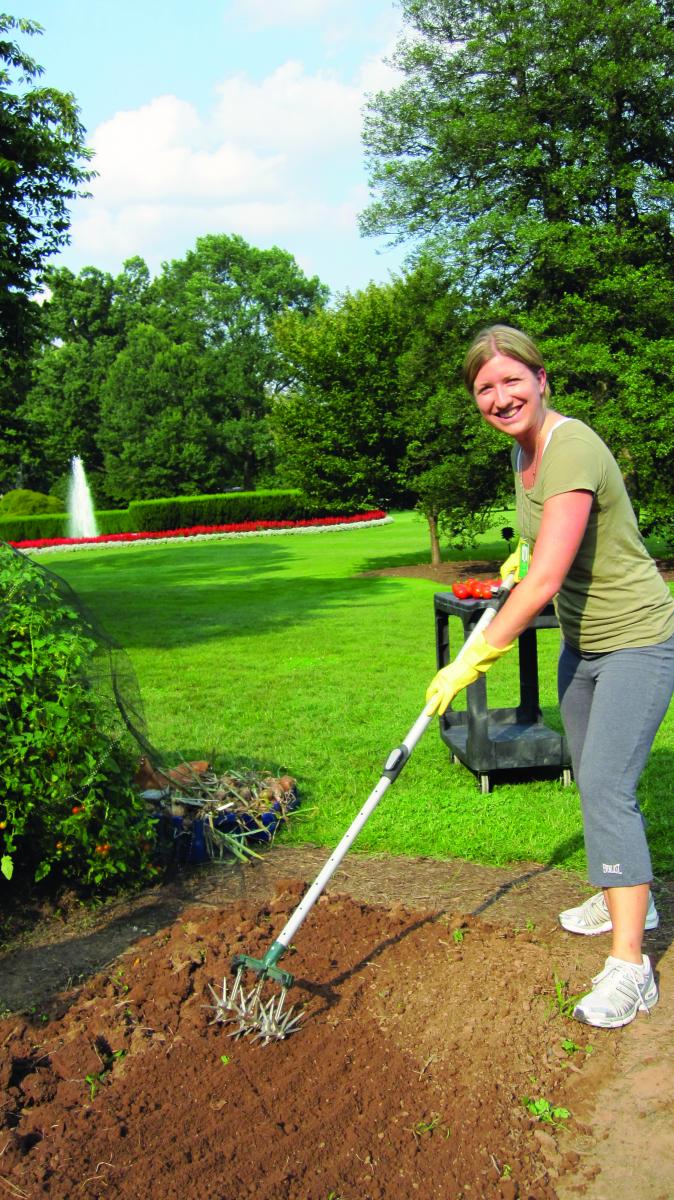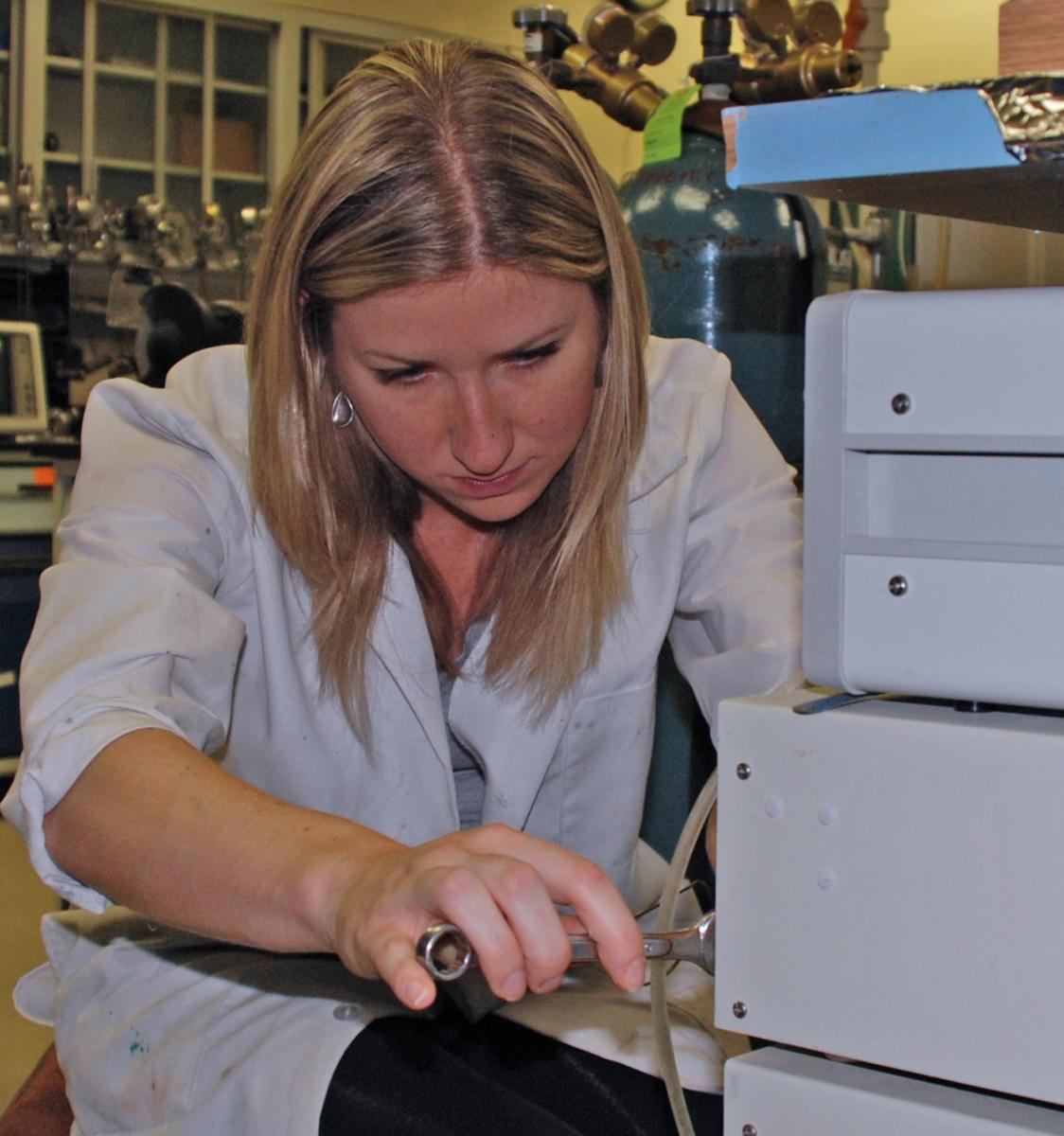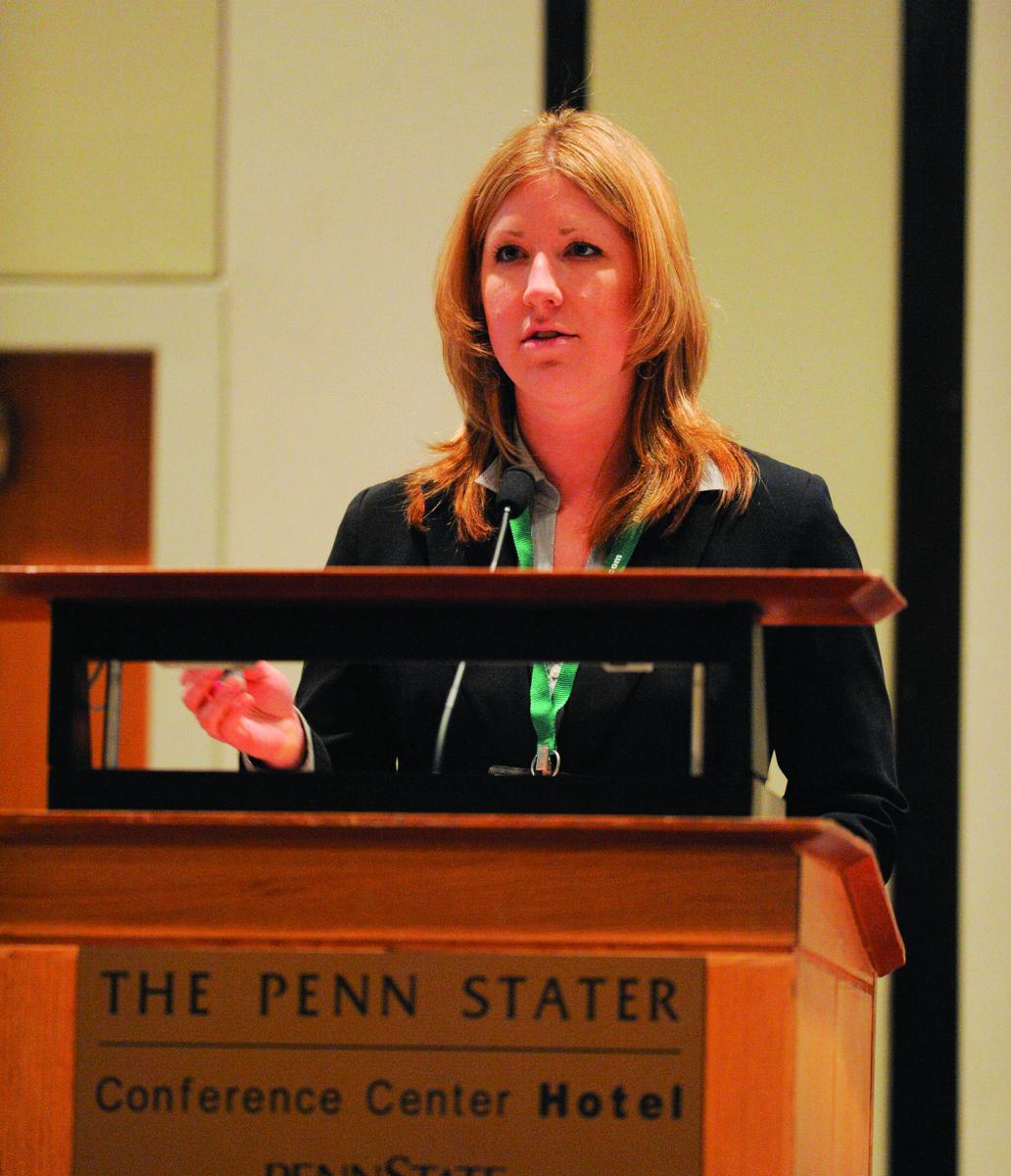Alumna spends a year working on environmental policy for the White House
By Shea Winton

As a White House employee, Nicole Reed was able to volunteer in the White House’s organic garden. Photo courtesy of Nicole Reed.
When the opportunity arose to take on environmental issues from one of the most influential offices in the country, Nicole Reed jumped at the chance and joined the White House Council on Environmental Quality (CEQ). As part of the Council, she has been able to witness governmental processes in action as she has helped to develop environmental policies and initiatives. Her role has brought many challenges and learning experiences, and even a chance to dig in the White House garden!
Since July 2009, Nicole Reed (’08 Energy and Geo-Environmental Engineering) has been working on the Communities, Environmental Protection, and Green Jobs team in the Council on Environmental Quality as part of a detail assignment expected to last about one year.
Congress established CEQ within the Executive Office of the President in 1970 as part of the National Environmental Policy Act. Today the Council works closely with federal agencies and other White House offices to develop environmental policies and initiatives in support of the President’s environmental goals. The Council’s Chair serves as the principal environmental policy adviser to the President.
Nicole is completing an 11-month rotation with the Council. In 2008, after graduating from Penn State, Nicole began working as an engineer for the Department of Energy (DOE) in the Geothermal Technologies Program in the Office of Energy Efficiency and Renewable Energy. At DOE she assisted with program management and some workforce development projects for renewable energy and energy efficiency industries. Since she is participating in the Federal Career Intern Program (FCIP), a two-year professional development program, Nicole was required to do a rotation outside of the Geothermal office of Energy Efficiency and Renewable Energy, and CEQ was looking for someone from DOE to help with the green jobs projects. Because of her energy efficiency work for DOE the detail assignment was a great fit.
Most of Nicole’s work for CEQ is on an initiative called Recovery rough Retrofit, an action plan to expand green jobs and increase energy savings by retrofitting existing homes to make them more energy efficient. The initiative is a collaboration between eleven departments and agencies, and six White House Offices. One of Nicole’s responsibilities is to plan and conduct meetings and manage the activities of this large interagency working group. In addition, she researches and analyzes current and proposed energy efficiency programs and policy options, and works with the Associate Director to coordinate policy implementation.
It was at Penn State that Nicole first became interested in clean energy. When she entered University Park campus, she was unsure about a major until a freshman seminar, taught by Dr. Dennis omson, who continues to be a mentor and friend, led her to the College of Earth and Mineral Sciences (EMS) and the Environmental Systems Engineering program.
As an undergraduate and graduate student at Penn State, Nicole spent a great deal of time at the EMS Energy Institute taking advantage of the diverse energy research opportunities. She enjoyed the hands-on research experience as well as the ability to exchange ideas and information with so many other interesting people.

Nicole Reed working at the EMS Energy Institute.
“Being in a lab was new to me,” Nicole said, “and it was both frightening and empowering.”
If lab work initially seemed overwhelming, she didn’t let that keep her away. In fact, she ended up spending about three years working in various areas of the Institute in part because of the outstanding support from fellow students, faculty and staff.
“I was amazed at how helpful everyone was,” Nicole said. Even after graduation that support has continued, as she formed many lasting relationships during her time at Penn State. “ There have been so many people from the College of EMS and the [EMS] Energy Institute that have supported me along the way, and I am incredibly grateful for their guidance.”
As an undergraduate, Nicole conducted research alongside Dr. André Boehman, professor of fuel science, to complete her senior honors thesis on the effects of small amounts of hydrogen addition on the combustion characteristics from a spark-ignition engine. She then spent about six months working for Joel Morrison, research associate at the EMS Energy Institute, as a technical writer and program assistant for the West Penn Power Sustainable Energy Fund (WPPSEF). In this position, she wrote about a variety of sustainable energy technologies being manufactured and deployed throughout Pennsylvania, including solar, wind, and biomass.
While completing her master’s degree, she spent two years working with Dr. Chunshan Song, distinguished professor of fuel science, in his clean fuels and catalysis program. Her research, a comparative analysis of various adsorbent materials utilized in desulfurization of liquid fuels for fuel cell applications, was the basis for her master’s thesis.

Nicole Reed speaks during the PA Home Energy Conference.
One of the highlights of Nicole’s time at the Institute was the 2006 PA Clean Energy Expo. While working for WPPSEF, Nicole helped create a program for high school students attending the Expo, including a scavenger hunt, and coordinate speakers to talk to the students about Penn State and future energy careers.
The fundamental research understanding Nicole gained from her out-of-classroom experience at the EMS Energy Institute continues to give her an edge in her work.
“Although I’m not doing calculations and lab experiments on the job anymore, I still need to keep up to date on the latest research…and my time at the Energy Institute and in Energy and Geo-Environmental Engineering definitely prepared me for that.”
She was exposed to energy and environmental issues, including clean energy technologies and energy efficiency while working for the Institute. This background knowledge is constantly useful as she meets daily with people from industry and nonprofit organizations to discuss their organizations’ achievements. The science and research background is also important for her “real” job with DOE, which is more technical in nature and which Nicole plans to return to once her position with CEQ ends.
For now, though, she is happy soaking up every new experience, gaining a behind-the-scenes knowledge of policy making, and working with people who really believe in what they do.
“I couldn’t be more thankful for the opportunity to be here at this point in my career,” she said. “I have always wanted to be at the intersection of energy and environmental issues and this is one of the best places to do that.”
In addition, Nicole recently had the opportunity to return to Penn State as a speaker for the 2010 PA Home Energy Conference. (PA Home Energy is a program from WPPSEF to help consumers reduce home energy.) As a representative of CEQ, Nicole provided an update of the Recover rough Retrofit program for one of the conference general sessions.
While CEQ has challenged her to think in a different way, learning about policy and finance has broadened her view of these issues and she’s been up to the task.
“I love that my work constantly requires me to develop and improve my general technical understanding of energy efficiency and renewable energy principles and policies,” she said.

